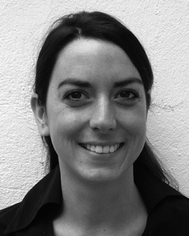
Isabelle Thomé
Scientist Research and Development, Hoffmann La Roche
links
https://www.couchsurfing.com/people/isabelle.thome
Experience
Postdoctoral Researcher with Prof. Phil S. Baran
The Scripps Research Institute
C-H Imidation of (hetero)arenes and natural product synthesis
Studies toward the total synthesis of a sesquiterpene
Studies toward the total synthesis of a sesquiterpene
Doctoral Student with Prof. Carsten Bolm
RWTH Aachen University
Development of new methods for the C-N bond formation
iron catalysis - cross couplings with parts-per-million quantities of copper - transition metal-free C-N bond formations
iron catalysis - cross couplings with parts-per-million quantities of copper - transition metal-free C-N bond formations
Interdoctoral Research with Prof. Bruce H. Lipshutz
UC Santa Barbara
Cross-couplings of alkyl with heteroaromatic halides, in water at room temperature
Collaboration with Prof. Stephen L. Buchwald
Massachusetts Institute of Technology (MIT)
On the role of metal contaminants in catalysis with FeCl3
Research Assistant
Karlsruhe Institute of Technology (KIT) / University of Karlsruhe (TH)
Honors & Awards
Feodor-Lynen Postdoctoral scholarship
Alexander von Humboldt
DAAD – German academic exchange service, scholarship
DAAD
Courses
Karlsruher Institut für Technologie (KIT)
- Chemical entrepreneurship

Publications
A Mild, Ferrocene-Catalyzed C–H Imidation of (Hetero)Arenes
Journal of the American Chemical Society
March 23, 2014
A simple method for direct C–H imidation is reported using a new perester-based self-immolating reagent and a base-metal catalyst. The succinimide products obtained can be easily deprotected in situ (if desired) to reveal the corresponding anilines directly. The scope of the reaction is broad, the conditions are extremely mild, and the reaction is tolerant of oxidizable and acid-labile...more
Catalytic, Asymmetric Synthesis of Phosphonic alpha-(Hydroxyalkyl)butenolides with Contiguous Quaternary and Tertiary Stereogenic Centers
Chemistry - A European Journal
January 8, 2014
A procedure that enables high yielding access to phosphonic γ-(hydroxyalkyl)butenolides with excellent regio-, diastereo- and enantiocontrol is reported. The simultaneous construction of up to two adjacent quaternary stereogenic centers by a catalytic asymmetric vinylogous Mukaiyama aldol reaction unites biologically and medicinally relevant entities, namely α-hydroxy phosphonates and γ-(...more
Transition-Metal-Free Intramolecular N-Arylations
Organic Letters
March 21, 2012
N-Substituted phenoxazines and related aza analogs have been prepared from N-acetylated aryloxy anilides by transition-metal-free, base-catalyzed cyclization reactions. In the presence of a mixture of 10 mol % of N,N′-dimethylethylenediamine (DMEDA) and 2 equiv of K2CO3 in toluene at 135 °C the products are obtained in high yields.
Base-Catalyzed Synthesis of Substituted Indazoles under Mild, Transition-Metal-Free Conditions
Angewandte Chemie
June 5, 2013
Back to basics: A transition-metal-free method developed for the synthesis of indazoles involves an inexpensive catalytic system composed of a diamine and K2CO3. Various (Z)-2-bromoacetophenone tosylhydrazones were converted into indazoles at room temperature in excellent yields (see example; Ts=p-toluenesulfonyl). The yield was improved by photoisomerization with UV light when E/Z isomeric...more
Trace metal impurities in catalysis
Chemical Society Reviews
January 4, 2012
Metal-catalysed transformations are a powerful tool in organic chemistry and the enormous progress, which has been made in the last few decades, was one more time honoured by the Nobel Prize in Chemistry in 2010. Many metal-containing compounds have been applied in carbon–carbon and carbon–heteroatom bond formations. However, not every component originally claimed as catalyst turned out to be the...more
Dimethyl Sulfoxide/Potassium Hydroxide: A Superbase for the Transition Metal-Free Preparation of Cross-Coupling Products
Advanced Synthesis and Catalysis
October 28, 2010
Potassium hydroxide (KOH) in dimethyl sulfoxide (DMSO) forms a superbasic medium that allows one to access cross-coupling products from reactions between aryl halides with various sulfur-, oxygen- and nitrogen-based nucleophiles under transition metal-free conditions.
Cross-couplings of alkyl halides with heteroaromatic halides, in water at room temperature
Tetrahedron Letters
April 27, 2011
Zn-mediated, Pd-catalyzed cross-coupling reactions between heteroaromatic and alkyl halides can be done at room temperature in pure water using a commercially available Pd catalyst and PTS, a nanomicelle-forming amphiphile. Notably, zinc metal inserts selectively into a carbon sp3-halide bond, while palladium adds oxidatively to a carbon sp2-bond.
Synthesis of Chiral Sulfoximine-Based Thioureas and their Application in Asymmetric Organocatalysis
Beilstein Journal of Organic Chemistry
September 3, 2012
For the first time, chiral sulfoximine derivatives have been applied as asymmetric organocatalysts. In combination with a thiourea-type backbone the sulfonimidoyl moiety leads to organocatalysts showing good reactivity in the catalytic desymmetrization of a cyclic meso-anhydride and moderate enantioselectivity in the catalytic asymmetric Biginelli reaction. Straightforward synthetic routes provide...more
The Journal of Physical Chemistry B
October 5, 2010
Single-molecule microscopy is a powerful tool for investigating various uptake mechanisms of cell-penetrating biomolecules. A particularly interesting class of potential transporter molecules are peptoids. Fluorescence labels for such experiments need to comply with several physical, chemical, and biological requirements. Herein, we report the synthesis and photophysical investigation of new...more
Karlsruher Institut für Technologie (KIT)
Diplom, Chemistry
Diploma thesis at Karlsruhe Institute of Technology (KIT)
Institute of Nanotechnology, Organic Chemistry
with Prof. Dr. Stefan Bräse, KIT, Germany
“New functionalized chromophores”
Institute of Nanotechnology, Organic Chemistry
with Prof. Dr. Stefan Bräse, KIT, Germany
“New functionalized chromophores”
Activities and Societies: Member of GDCh (German Chemical Society) and active member of JCF (JungChemikerForum, Karlsruhe/Aachen, Germany)

/////////////









No comments:
Post a Comment